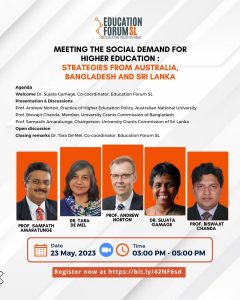Amendment to the penal code on corporal punishment for children goes too far? දරුවන් හිංසනයෙන් මුදවා ගැනීමේ නීති සංශෝධනය සීමාව ඉක්මවා ගියාද? මේ වන විට පාසල් දරුවන්ට විය හැකි හිංසනයන් වලක්වා ගැනීම් අරමුණෙන් අධිකරණ සහ ජාාතික ඒකාාබද්ධතා අමාාත්යතුමා විසින් 2025 අගෝස්තු මස් 19 වැනි දින පනත් කෙටුම් පතක් ඉදිරිපත් කර ඇත. එය පළමුවැනි හා දෙවැනි වරටත් පාර්ලිමේන්තුවේ කියවීම සමාප්ත වී ඇත. නමුත් සමාජයේ එම සංශෝධන පනත පිළිබඳව ඇතිවී තිබෙන තියුණු වාද විවාද නිසා එම කෙටුම් පත පනතක් ලෙස නීති ගත කිරීම කල් ගොස් ඇති බව පෙනෙනවා.
එදා බැරි වුනු අධ්යාපන ප්රතිසංස්කරණ අද කරන්න පුළුවන් ඇයි? : 2023-2033 ජාතික අධ්යාපන ප්රතිපත්ති රාමුව පිළිබඳ විශ්ලේෂණයක් by Sujata Gamage 2023 ජූලි මාසයේදී කැබිනට් මණ්ඩලය විසින් ජාතික අධ්යාපන ප්රතිපත්ති රාමුවක් සැකසීම සඳහා ජනාධිපතිවරයාගේ සභාපතිත්වයෙන් පත් කෙරුණු කැබිනට් අනු කමිටුව විසින් අද වන විට එම ජාතික අධ්යාපන ප්රතිපත්ති රාමුව 2023-2033 (හෝ National Education Policy Framework 2023-2033) අධ්යාපනය පිළිබඳ ආංශික අධීක්ෂණ කමිටුවේ හා දෙවනුව සමස්ත පාර්ලිමේන්තුවේ විමර්ශනය සඳහා ඉදිරිපත් කොට ඇත. මෙම ලිපියේ අරමුණ එම ප්රතිපත්ති රාමුවේ සුවිශේෂ අංගයන් ලෙස මා දකින- (1) ව්යුහාත්මක වෙනස්කම් වලට අවධානය දීම (2) දැනටමත් එම ප්රතිසංස්කරණ සඳහා රාජ්ය ආයතන විසින් සුළු හෝ වැඩි ලෙස ක්රියාත්මක වෙමින් සිටීම, හා (3) අද පවතින සමාජ ආර්ථික වටපිටාව යන — කාරණා නිසා එදා බැරි වුනු අධ්යාපන ප්රතිසංස්කරණ අද කරන්න පුළුවන් වේ යන මතය ඉදිරිපත් කිරීමයි. එදා බැරි වුනු අධ්යාපන ප්රතිසංස්කරණ ලෙස මා අදහස් කරන්නේ 1943 අධ්යාපනය පිලිබඳ විශේෂ කාරක සභාවේ වාර්තාව මත පදනම්වූ ප්රතිසංස්කරණ හා ඊට පසුව කෙරුණු ප්රතිසංස්කරණයන්ය. එයින් මෑතකදී කෙරුණු වැදගත්ම ප්රතිසංස්කරණය වන්නේ 1997 ජනාධිපති කාර්ය සාධක බලකායක් මගින් සාමාන්ය අධ්යාපනයේ ප්රතිසංස්කරණ පිළිබඳව නිකුත් කරන ලද වාර්තාවක් පදනම්ව එවකට ජනාධිපති චන්ද්රිකා බණ්ඩාරනායක කුමාරතුංග මහත්මියගේ පූර්ණ කැපවීම ඇතිව මූලිකවම ප්රාථමික විෂය මාලාව හා ඉගෙනුම් ඉගැන්වීම් ක්රියාවලියේ ගැඹුරු වෙනස්කම්ය.
[Extracted from the report “A Strategic Plan for the Department of Examination” Prepared by Committee of Experts for Reforming the Department of Examination appointed by the Minister for Education dated December 2017.] The Department of Examination is perhaps the government department with the most impact on society in Sri Lanka. Families organize their lives around the schedules of the three national examinations. Success at these examinations is seen as the major avenue of social mobility, but the exam-centered nature of the education system is also widely seen as the root cause of problems of education in Sri Lanka. This observation is reiterated in all three key reports on the examination system and/or general education published recently (MoE, 2009; NEC, 2014 and NEC, 2016).
Download Plan : Sinhala English A Strategic Plan for the Department of Examination for implementation in 2018-2019 was prepared by Committee of Experts to review examinations and evaluation system and roles and functions of the Department of Examinations to make recommendations for improving the quality and standards of testing and evaluation systems in Sri Lanka appointed by the Secretary for Education by letter dated April 28, 2017. Members of the Committee Ex-officio: Mr. S.U.Wijerathne (Chair) and Mr.

May 23, 2023 FULL VIDEO: https://youtu.be/P9FLkGE9Rgg PANEL: Prof. Andrew Norton, Professor in the Practice of Higher Education Policy, Australian National University, Higher education student charges and income contingent loans in Australia Prof. Biswajit Chanda, Member, UGC, Bangladesh, Meeting the social demand for higher education: A Bangladesh perspective Prof. Sampath Amaratunge, Chairman, UGC, Sri Lanka, Current higher education system in Sri Lanka and recommendations for its expansion (00:45:30-1:13:00 on video) QUOTE of the day: A public sector supply that is free or very cheap, and hence constrained in quantity and quality, leads to greater use of private institutions than in most OECD countries and extensive study abroad.
Delegating Education Decision Making to Provinces is a Constitutional MandateNot a Discretion for the Ministry of Education We are pleased to note that that the Ministry of Education has delegated policymaking during the fuel crisis to provincial authorities with decisions on keeping school opened delegated down to the school level with oversight by zonal authorities. Additionally, ministry has also announced delegating teacher deployment responsibilities to Provincial authorities with exceptions regarding national schools. While we are pleased with these developments, we wish to reiterate that the Constitution indeed delegates “supervision of management of state schools” and other responsibilities to the provinces. Further, duties and functions of the Minister for Education, as per the latest gazette or ones before, do not entail decision-making regarding schools. As stated in the latest gazette, the duties and functions of the Minister for Education is “Formulation of policies, programs and projects, monitoring and evaluation in regard to the subject of education and those subjects that come under the purview of Departments, Statutory Institutions and Public Corporations listed in the gazette.
A free webinar “Private Sector Role in Enhancing K-12 Education in Sri Lanka” will be held by Sri Lanka Singapore Business Council (SLSBC) of the Ceylon Chamber of Commerce online via zoom from 2:30pm to 3:45pm on Wednesday 23rd March 2022. The panelists will include Dr. Sujata Gamage (Senior Research Fellow of LIRNEasia), Dr. Harsha Alles(Chairman, Gateway Group, and Member, Presidential task Force on Education Reform), and Dr. Upali M.

වසංගතයෙන් පසු අධ්යාපනය | பிளேக்கிற்குப் பிறகு கல்வி A policy dialogue on “ Education Post-Pandemic”‘ was held by the Education Forum Sri Lanka (EFSL) on 26th March 2022, via Zoom. Watch the Policy Dialogue: Video PRESENTATIONS Transforming Education for All Post COVID-19 – Ms. Takaho Fukami, Chief of Education, UNESCO Survey on the Impact of Covid-19 on Education in Sri Lanka – Ms. Gayani Hurulle, Senior Research Manager, LIRNEasia DISCUSSION With designated responses from: – Mr. Harshana Perera, Asian International School, Colombo – Ms.
සම්ප්රදායක් ලෙස සියලුම ගුරුවරියන් විසින් සාරියක් ඇඳ සේවයට එන පාසලක් වන ෂන්මුගා හින්දු කාන්තා විද්යාලයේ (SHLC) ගුරුවරුන් පිරිසක් සේවය කිරීමට අබායා ගවුම ඇඳීමට පටන් ගැනීමත් සමඟ විරසකයක් ඇති වී ඇත.. මුස්ලිම් ගුරුවරුන් මූලික අයිතිවාසිකම් නඩුවක් ගොනු කර අබායා ඇඳ පාසැලට පැමිණීමේ අයිතිය ලබා ජයග්රහණය කළ නමුත් ඔවුන් තවදුරටත් එම්ම පාසලේම සේවය කිඊමේ අයිතිය සඳහාද නැවත ආයාචනා කර ඇත. ඉංග්රීසියෙන් පලවූ ලිපියක ආචාර්ය අමීර් අලි පෙන්වා දෙන පරිදි, වාර්ගික සහජීවනය පිළිබඳ විශාල ප්රශ්නයේ නාමයෙන් ඔවුන් පසු බැස වෙනත් පාසලකට මාරුවක් ඉල්ලා සිටිය යුතුව තිබුණි. “නඩුව ජයග්රහණය කර ඔවුන්ගේ තර්කය ඔප්පු කිරීමෙන් එම ගුරුවරුන් SHLC සම්ප්රදායන්ට ගරු කර, ස්වේච්ඡාවෙන් වෙනත් පාසලකට මාරු කරනු ලැබුවේ නම්, ආරවුල අමනාපයකින් තොරව සහ තොරව සාමකාමීව විසඳා ගැනීමට ඉඩ තිබුණි.
A rift was created when a group of teachers started wearing the abaya to work at Shanmuga Hindu Ladies College (SHLC), a school where all female teachers wore a saree. Sri Lankan Muslim women had a long tradition of wearing a saree, with one end used to cover their head, until some returning home after working in the Middle East introduced the abaya. The muslim teachers filed a fundamental rights case and they won, but If tensions were not high enough, the teachers appealed to force SHLC to let them back in to the school whose traditions they just turned upside down. As Prof. Ameer Ai points out they should have backed down and requested a transfer to another school, in the name of the larger issue of racial harmony.
 May 23, 2023 FULL VIDEO: https://youtu.be/P9FLkGE9Rgg PANEL: Prof. Andrew Norton, Professor in the Practice of Higher Education Policy, Australian National University, Higher education student charges and income contingent loans in Australia Prof. Biswajit Chanda, Member, UGC, Bangladesh, Meeting the social demand for higher education: A Bangladesh perspective Prof. Sampath Amaratunge, Chairman, UGC, Sri Lanka, Current higher education system in Sri Lanka and recommendations for its expansion (00:45:30-1:13:00 on video) QUOTE of the day: A public sector supply that is free or very cheap, and hence constrained in quantity and quality, leads to greater use of private institutions than in most OECD countries and extensive study abroad.
May 23, 2023 FULL VIDEO: https://youtu.be/P9FLkGE9Rgg PANEL: Prof. Andrew Norton, Professor in the Practice of Higher Education Policy, Australian National University, Higher education student charges and income contingent loans in Australia Prof. Biswajit Chanda, Member, UGC, Bangladesh, Meeting the social demand for higher education: A Bangladesh perspective Prof. Sampath Amaratunge, Chairman, UGC, Sri Lanka, Current higher education system in Sri Lanka and recommendations for its expansion (00:45:30-1:13:00 on video) QUOTE of the day: A public sector supply that is free or very cheap, and hence constrained in quantity and quality, leads to greater use of private institutions than in most OECD countries and extensive study abroad.  වසංගතයෙන් පසු අධ්යාපනය | பிளேக்கிற்குப் பிறகு கல்வி A policy dialogue on “ Education Post-Pandemic”‘ was held by the Education Forum Sri Lanka (EFSL) on 26th March 2022, via Zoom. Watch the Policy Dialogue: Video PRESENTATIONS Transforming Education for All Post COVID-19 – Ms. Takaho Fukami, Chief of Education, UNESCO Survey on the Impact of Covid-19 on Education in Sri Lanka – Ms. Gayani Hurulle, Senior Research Manager, LIRNEasia DISCUSSION With designated responses from: – Mr. Harshana Perera, Asian International School, Colombo – Ms.
වසංගතයෙන් පසු අධ්යාපනය | பிளேக்கிற்குப் பிறகு கல்வி A policy dialogue on “ Education Post-Pandemic”‘ was held by the Education Forum Sri Lanka (EFSL) on 26th March 2022, via Zoom. Watch the Policy Dialogue: Video PRESENTATIONS Transforming Education for All Post COVID-19 – Ms. Takaho Fukami, Chief of Education, UNESCO Survey on the Impact of Covid-19 on Education in Sri Lanka – Ms. Gayani Hurulle, Senior Research Manager, LIRNEasia DISCUSSION With designated responses from: – Mr. Harshana Perera, Asian International School, Colombo – Ms. 